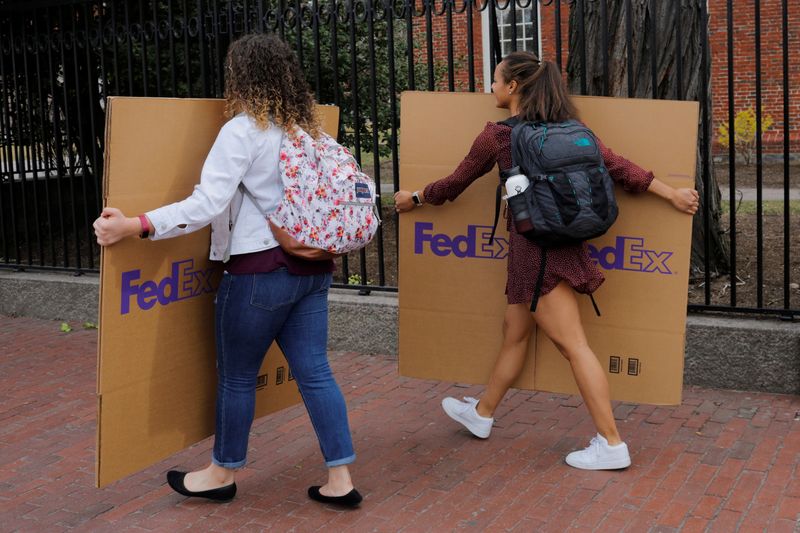By Beth Pinsker
NEW YORK (Reuters) - George Curtis is facing a severe financial crisis.
He has to be out of his Swarthmore College dorm room by Sunday. He lost his campus job and cannot travel home to Montana from the Philadelphia-area liberal arts college because he is not feeling well.
Nor does he want to endanger the health of his 71-year-old father.
There were about 20 million students attending U.S. colleges and universities as of last fall, according to the National Center for Education Statistics. Now, like Curtis, a 20-year-old Classics junior, many of them are in limbo because of coronavirus closures on campuses.
Swarthmore, like most every major institution of higher education, is moving to remote learning in the coming days and sending students packing, except a few who receive exemptions to stay on campus.
The competition for those spots is tough, and Curtis was denied.
College communities are responding in a variety of ways, some offering pro-rated refunds for room and board, covering travel for those on financial aid and offering stipends for moving and packing expenses. U-Haul is also offering free storage for students across the country. (https://
Harvard's Primus organization, for first-generation low-income students, reached out immediately to the school's vast alumni network with a set of Google (NASDAQ:GOOGL) spreadsheets to find out who could take in students, store boxes and offer jobs.
At Berea College in Kentucky, a free-tuition institution that serves a low-income population, President Lyle Roelofs said he expects to house more than 200 students out of 1,660 because they have nowhere else to go. Remote instruction is being tailored to a population that does not have reliable internet at home, and deadlines to drop classes have been extended.
There are also crowd-sourcing appeals coming from all over to help American students. As these are not vetted or registered charities, potential donors should do their own research before sending funds.
To help students beyond just one's own school affiliation, there are national efforts that are official charities, like the Student Relief Fund (studentrelieffund.org).
For Sara Goldrick-Rab, the founding director of the Hope Center for College, Community and Justice and a professor at Temple University in Philadelphia, the current situation highlights an ongoing crisis of income instability for many college students. She has a running hashtag on social media (#RealCollege) to help raise awareness.
One plea Goldrick-Rab received was from a young woman who is being raised by her sister, who is also in college. With her school closing, she needed to get from Florida to Ohio, but she had no funds, so she was going to try to hitchhike.
"People think that these students will go home and party and chill and mom and dad will take care of them. Some of them will. Good for them. But a lot of them aren't in that situation," Goldrick-Rab said.
CONTINUING ED
Sustained online learning presents a few particular financial issues for students:
* Students using military stipends via the GI Bill may face a lower housing payout "for any subsequent terms pursued solely online," according to Christina Mandreucci, press secretary for the Department of Veterans Affairs. If the program is not approved by the relevant authority, all funding could stop, she noted.
* Students who chose to discontinue or pause their studies rather than continue with online learning may go into repayment status on their student loans, or use up their six-month grace period.
"The best advice is to make a phone call to the loan servicer and see what applies to your situation," said Sabrina Manville, co-founder of Edmit.me, a college financial information site.
* Students already in repayment status who are facing income disruptions should also heed the advice to call their loan servicer and check into their options, Manville said. Those who think this might be a long-term issue can look into income-driven repayment plans, and for just short-term issues there are forbearance options that can pause your payment. Deferment is a middle option, Manville said, because interest still accrues on the loan balance.
President Donald Trump announced on Friday that student loan interest would be waived until further notice.
* Students who are no longer on campus also no longer have income from their student jobs. This is still a developing situation, so most schools have not announced how they will help. At Berea College, though, Roelofs said students would continue to be paid.
For now, Curtis is planning to couch-surf somewhere in the Northeast and get by as best he can. He and his friends still on campus are using up as many of their meal credits as possible.
"It’s like Belshazzar’s Feast,” Curtis said, referring to the biblical story and the Rembrandt painting depicting it.

(Follow us @ReutersMoney or at http://www.reuters.com/finance/personal-finance. Editing by Lauren Young, Dan Grebler and Matthew Lewis)